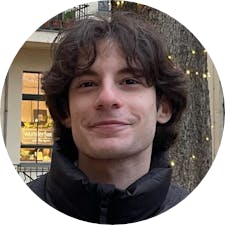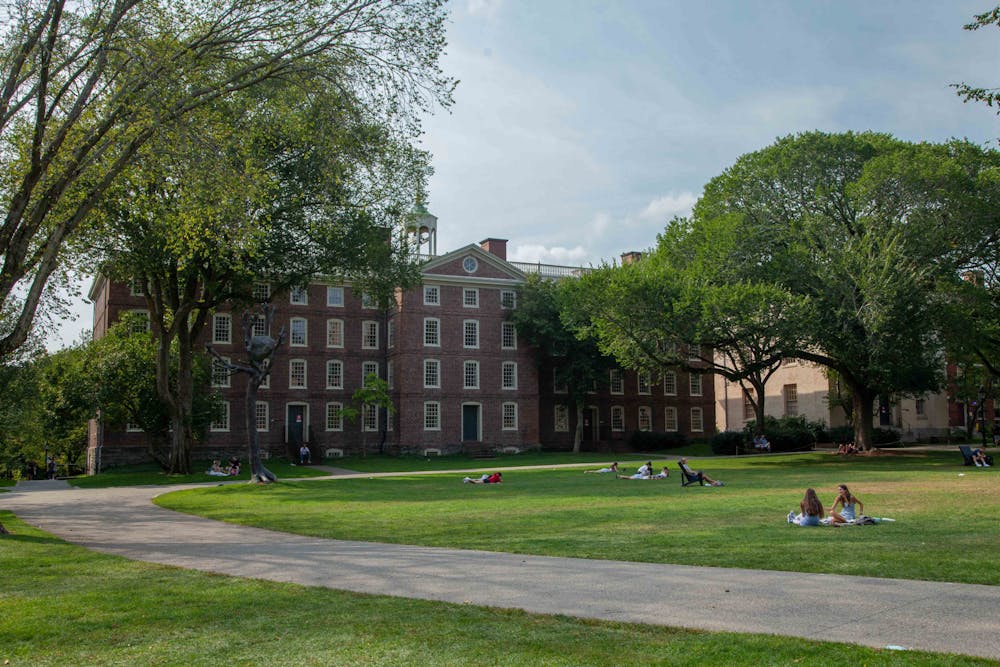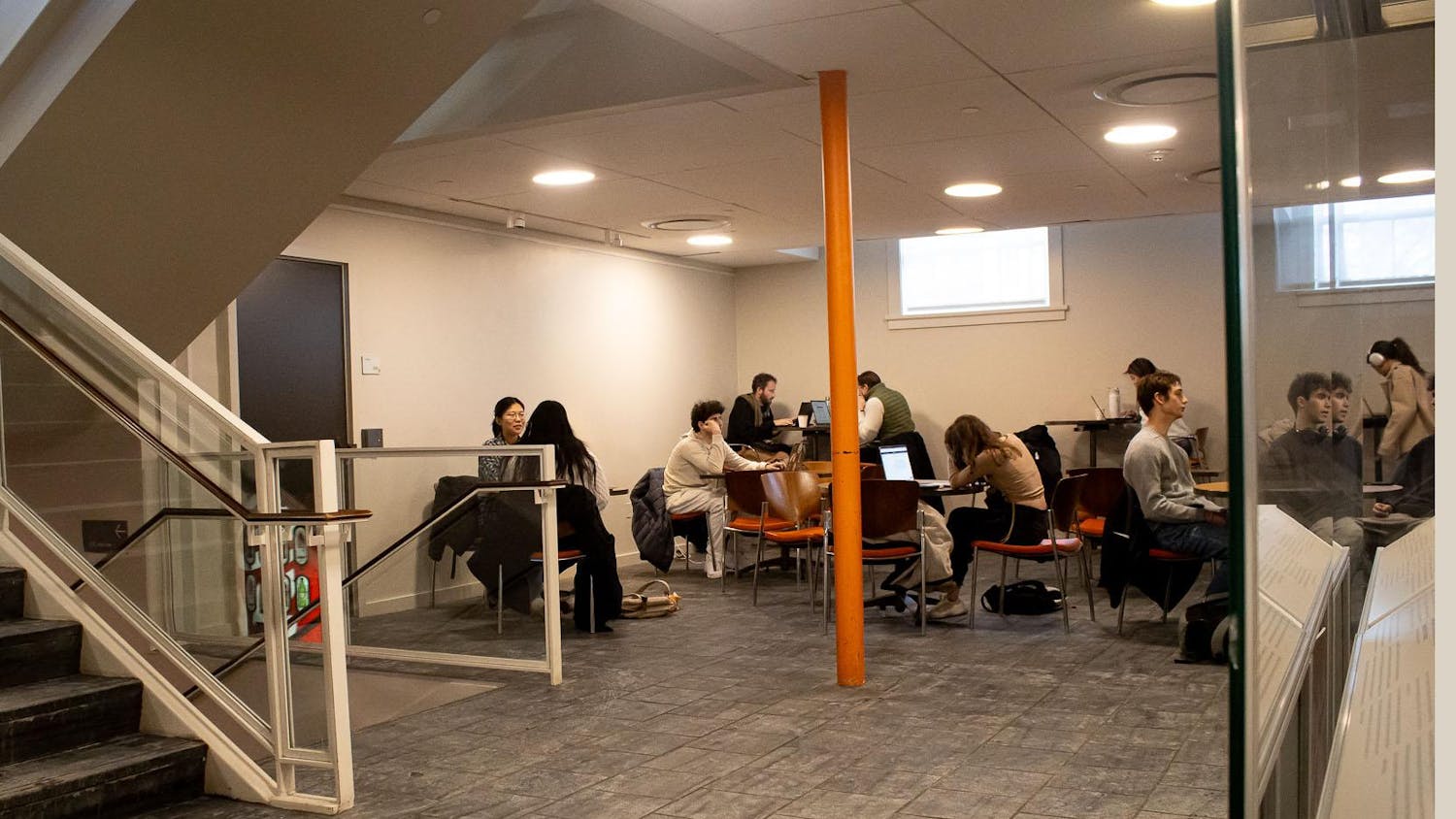Members of the University's faculty and administration voted in favor of establishing a Center for Philosophy, Politics and Economics effective July 1 at the final formal faculty meeting of the academic year Tuesday. The motion to establish the center passed with a 55% majority.
President Christina Paxson P’19 said at the meeting that she will now take the PPE Center proposal to the Corporation, the University’s highest governing body.
Plans to establish a PPE Center were first introduced by the Faculty Executive Committee on Nov. 23, 2021, according to Govind Menon PhD’01, professor of applied mathematics. Further deliberations took place at a Dec. 2 faculty commons and the Dec. 7 faculty meeting. At the Feb. 1 faculty meeting, faculty and administration opted to delay the vote on establishing the center until the Advisory Committee on University Resource Management released recommendations on whether to adopt a proposal by Scholars at Brown for Climate Action to revise the University’s gift and grant acceptance policy.
Faculty previously expressed concern about the potential influence of science-denying donors in the creation of the PPE Center. The center will absorb the Political Theory Project, a University research center which previously received funding from the Koch Foundation, a foundation run by billionaire and conservative political mega-donor Charles Koch, The Herald previously reported.
Last month, following the release of several recommendations by ACURM, Paxson announced that the University would amend its business ethics policies and “enhance” its gift and grant acceptance processes to ensure Brown does not conduct any further work with individuals and organizations that advance science disinformation, The Herald previously reported.
At the Tuesday meeting, Kristina Mendicino, associate professor of German studies, opened the discussion on establishing the PPE Center by questioning how the center would go about hiring faculty to fill the two to three endowed chair positions outlined in its proposal.
Referencing a cluster of hires of chairs in arts departments associated with the Brown Arts Institute from earlier this year, which followed a different hiring procedure than the University's standard process, Mendocino said she felt that there was a “precedent of moving hires and appointments away from individual departments and departmental autonomy.”
Provost Richard Locke P’18 said that the standard faculty hiring process would be followed when appointing faculty to the PPE Center. The center would work with the philosophy, political science and economics departments to conduct open searches for candidates and let the faculty of the department review and vote on a full list of potential appointments.
Dawn King, senior lecturer in environment and society, expressed concern over the center’s name, specifically because several PPE centers at other universities have received funding from the Koch Foundation.
King said she felt that by changing the center’s name, the University could distance itself from a 2015 grant proposal set forth by the John Templeton Foundation, a Koch-affiliated foundation, which detailed plans to create a national PPE network that would span “three continents and at least eight universities.” The proposal was not affiliated with the University, but mentioned Brown as an option for inclusion in the network.
“The PPE name has demonstrated … a connection to a network of donors that had been instrumental in pushing anti-choice (ideology), … voter suppression (and) the nonsense about (suppressing) critical race theory,” said Naoko Shibusawa, associate professor of history, American studies and ethnic studies.
By renaming the center, the University “would signal that something new, something different, … something innovative will, in fact, be happening here on our campus,” said Gerhard Richter, professor of German studies and comparative literature.
Alexander Gourevitch, associate professor of political science, said he believes “the worst thing we can do is allow a particular ideological group to colonize” the PPE name.
According to Gourevitch, many students at the University have pursued studies and independent concentrations in politics, philosophy and economics. Moving away from this name would “give students the idea that PPE is something that’s clearly and self-evidently libertarian … (rather than) the intersection of three analytical perspectives and disciplines,” he said.
Locke said that once the center is established, there are University procedures to propose a name change should the faculty involved feel it is necessary.
For Seth Rockman, associate professor of history, the PPE Center’s absorption of the Political Theory Project was a point of concern. “The baggage and weight of the PTP hangs over (the new center) and holds it down,” he said.
One of the ways to “move this conversation forward is if the senior leadership of the University said that the PTP project was, in fact, an ideological project and … (that they) want to build something that is not going to reproduce” an ideological space for conservative libertarian actors to introduce their ideas on campus, Rockman said.
Paxson said the future of the center will be determined by the faculty members who would be at the head of its governance, not by the University’s senior leadership.
In response to conversations about spaces for certain political ideologies on campus, Pedro Dal Bó, associate professor of economics, said that “it seems that some ideological statements are tolerable, and others should be punished (and that) the University should apologize for having had libertarians on campus.”
Gourevitch said he is grateful for having been in contact with libertarians on campus and believes both his instruction and personal beliefs have benefited from the resulting academic debates. “One of the reasons that I’ve been a supporter of the PPE (Center) is because it’s a formally organized center with clear faculty governance structures and established rules for what donors can and can’t do,” he said.
“It’s an open tent, and I think that the PPE Center … is (a place for) people who want to get engaged in the work of political economy,” Locke said. “There are many people who have expressed an interest in participating … (who) would be welcome.”
With the motion to establish the center passed, Paxson said she intends to take the faculty meeting’s minutes to the upcoming Corporation meeting so they can “really understand the nature” of the concerns brought forth by the faculty.
Task force, committee updates
Diane Lipscombe, professor of neuroscience and director of the Carney Institute, spoke at the meeting on behalf of the Task Force on the Status of Women Faculty.
The task force has found that compensation, access to timely and accurate information in the domains of human resources, childcare and family care responsibilities and the need for flexibility are among the principal concerns of the University's female faculty, according to Lipscombe. The task force is expected to present its final report to Paxson and Locke sometime in the summer.
The Task Force on Doctoral Education is currently drafting recommendations on both departmental and University-level changes that can be made to enhance professional development, advising, mentoring, diversity and research support for doctoral students, according to its chair Thomas Lewis ’90, associate dean of academic affairs.
The Library Advisory Council, Academic Priorities Committee and Committee on Faculty Equity and Diversity also presented their end-of-year reports in the agenda provided to the faculty in advance of the meeting.
The faculty also voted to appoint Chanelle Howe, associate professor of epidemiology, and Amy Russell, associate professor of classics, to the Committee on Nominations effective July 1.
President’s report, plans to expand University’s research enterprise
Paxson also spoke at the meeting on the University's plans to double the size of its research enterprise in the next five to seven years by supporting existing research projects, increasing the number of scholars conducting research and improving the research spaces at the University, The Herald previously reported.
She assured the faculty that the University will maintain its dedication to undergraduate education as it expands its research enterprise. “When I look at this group of people who have (recently been) honored with internal research awards, they are some of our best faculty at Brown,” Paxson said. “Seeing the research and the teaching go together is truly gratifying.”
Locke, in collaboration with senior academic deans and several faculty leaders, is developing a draft plan on how the University intends to grow its research portfolio. The plan will be shared with the faculty in June to allow for collective feedback on how the proposal could be refined and amended.
In her closing remarks, Paxson commended the University community for its perseverance throughout the pandemic. She specifically highlighted that the University has nearly doubled the number of faculty from historically underrepresented groups in the past six years, has enhanced its financial aid awards for low-income, middle-class and international students and has continued its commitment to local education in Providence.
The pandemic “was hard on everybody,” Paxson said. But “we’ve done some really remarkable things as a University and community.”

Alex Nadirashvili was the managing editor of multimedia and social media for The Brown Daily Herald's 133rd Editorial Board. As a former University News editor, he covered faculty, higher education and student life, though his proudest legacy is The Brown Daily Herald TikTok account.





